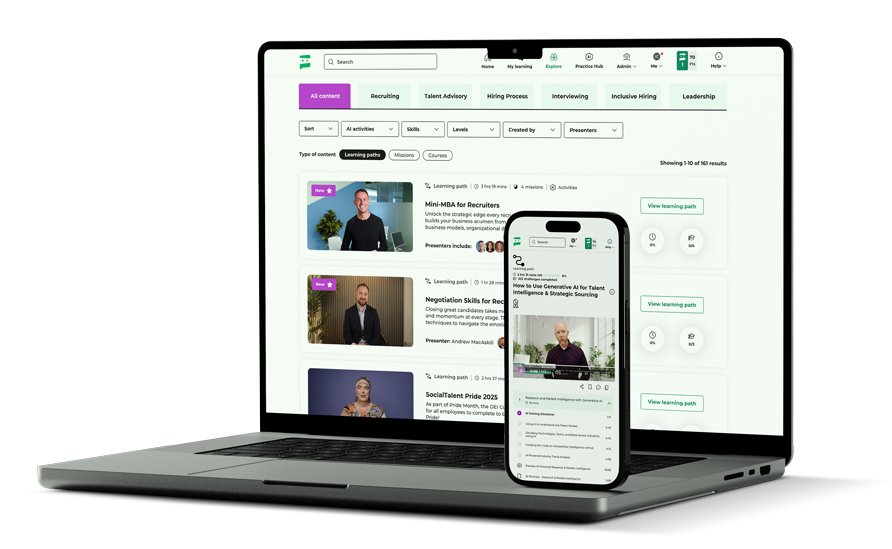
By Johnny Campbell
Staying updated on the latest workforce trends is crucial for TA leaders and HR professionals. This week, we delve into three significant developments shaping the talent landscape and get SocialTalent CEO, Johnny Campell’s first-hand takes on these pieces.
- First, we dive into one of McKinsey’s latest articles about the pitfalls and potential bias involved in succession planning. A needed klaxon for the importance of looking at what a company needs rather than wants.
- Markoz Ivanovic’s short piece on the issue of uniformity with AI is a thought-provoking take on a real problem. While not specifically aimed at the recruiting space, his arguments are hugely transferable and should be noted.
- Is ‘people risk’ about to become big issue for companies? Financial Post seems to think so. From wellbeing to talent management, this report suggests that for organizations to thrive, they need to start taking these issues more seriously.
Join us as we explore these pivotal insights and their implications for the future of work.

1. Bias Busters: Next in Line? A Structured Approach to Succession Planning
Source: McKinsey
Effective succession planning is crucial for smooth CEO transitions. In this article, a midsize oil and gas company struggles after appointing a CEO chosen by his predecessor, leading to poor performance and costly corrections. Boards should avoid bias toward similar successors and instead use structured, proactive planning involving diverse perspectives to align leadership with future needs. This minimizes disruptions and ensures continuity.
Johnny Campbell’s take on this:
“A great reminder that even the biggest companies in the world do hiring poorly at the very highest levels! Most of us aren’t recruiting replacement CEOs every day but the point remains valid about not letting similarity bias get in the way for any hiring manager. Planning is the key, using an unbiased approach that ideally pipelines candidates well in advance. Good advice for hiring any role from Cashier to Chief Exec.“
2. How AI Personalization Fuels Groupthink and Uniformity
Source: Markoz Ivanovic
This article critically examines the rise of AI-driven suggestion tools, like those in Slack, which use private user data for features such as autocomplete, emoji suggestions, and search results. While these features enhance user experience, they risk stifling creativity and promoting groupthink by reinforcing conventional ideas and limiting novel expressions. The concern is that AI personalization could lead to an echo chamber, narrowing the range of ideas and solutions in business communications.
Johnny Campbell’s take on this:
“A short, simple, and thoughtful response to most people’s excitement about how AI can help us complete sentences, write text, and improve searches. Reminds me of the opening scene in Wall-E when all the passengers are lounging around in their deck chairs. Beware the lure of “easy” and how it can instead make us lazy and devoid of creativity!“
3. Why ‘People Risk’ is Jumping to the Top of the Corporate Agenda
Source: Financial Post
In today’s near-full employment landscape, “people risk” has become a critical concern for organizations. Defined as the potential for employees, managers, and leaders to impact a company’s value negatively or positively, managing people risk involves addressing health and safety, talent management, corporate culture, and employee well-being. Despite its importance, ownership of people risk within companies remains unclear, and few organizations are prepared for upcoming policy changes. Emphasizing people risk in corporate strategy and governance can lead to better performance and resilience, making it essential for businesses to prioritize this issue now.
Johnny Campbell’s take on this:
“Let me just say that I hate the phrase “people risk” but don’t be put off, this article makes some excellent points and maybe putting the word “risk” in will finally make the C-suite take notice of the pressing people issues it faces. I particularly love the angle on people metric reporting. What if every public company had to publish employee engagement scores and attrition levels? Wouldn’t that make for an interesting world?“


